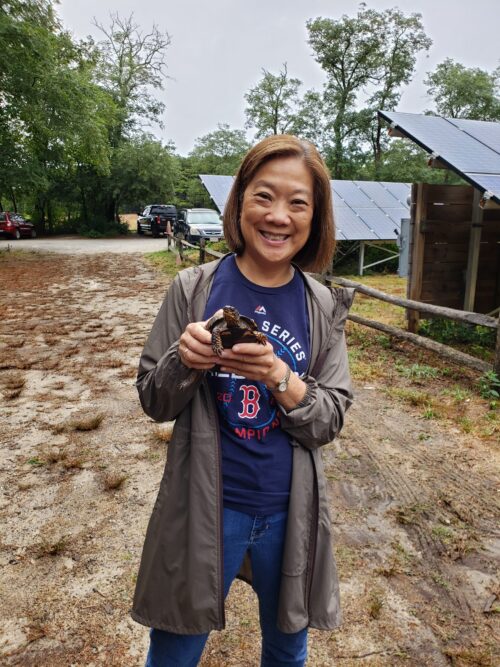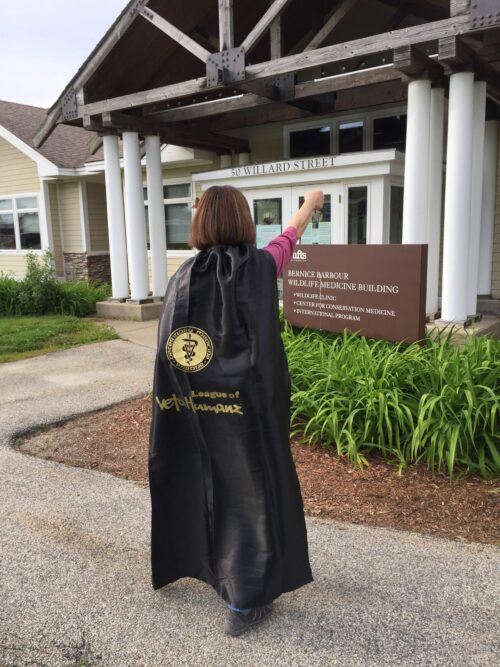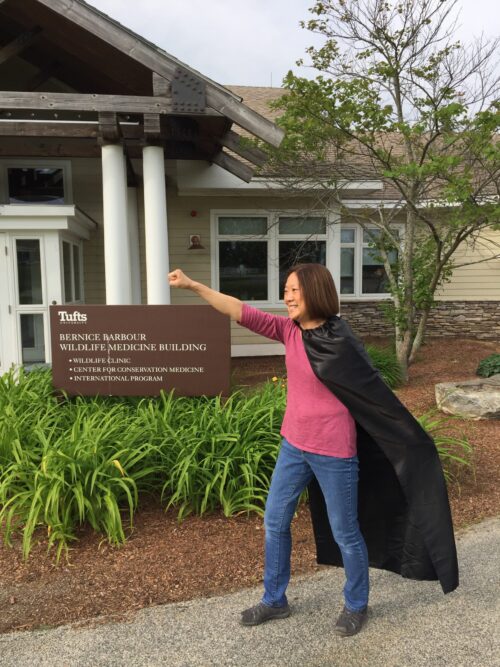PORCUPINEVET
Dr. Flo Tseng
Associate Professor and Assistant Dean for Diversity, Inclusion, Equity and Climate, Cummings School of Veterinary Medicine at Tufts University, North Grafton, MA | Clinician, Wildlife Clinic, Cummings School of Veterinary Medicine at Tufts University, North Grafton, MA | DVM 1981, Cornell UniversityVetaHumanz Live! Podcast
Dr. Tseng was featured in Episode 15 of the VetaHumanz Live! Podcast. Listen now.

My Story
My father was a physician and I grew up in a traditional Chinese family. That meant that I had to (literally!) petition my parents to get my first dog. The expectation in the family was that all 4 of us kids would go on to become physicians but, fortunately, my father eventually came around to the idea of me being a veterinarian (2 of my siblings are physicians). My interests in veterinary medicine probably started later than most – I was thinking about being a physician when I first started college but realized that I was always more interested in natural history and animal behavior. Veterinary medicine seemed like the ideal profession to include all of these interests. I’ve even been able to incorporate my passions as I’ve been a full time wildlife veterinarian since 1990!
My Struggles
After first convincing my father that being a veterinarian was a worthy profession, I began at Cornell in the first class to have more women than male students. There was definitely some adjustment on the part of the mostly male faculty at that time, especially some of the older veterinarians . As I started out in private practice, there were the invariable problems with clients mispronouncing my last name and questioning me “Where are you from?” (I was born in Chicago), “No, where are you REALLY from?”. Going into wildlife medicine was a challenge since, at the time, it was a brand new field and I didn’t know any other women who were doing this. Fortunately, I had great mentors and am now mentoring a whole new generation of wildlife veterinarians!

My Heroes
My parents were always my role models since they showed such resilience in coming to the US from China right after WWII. They had to carve out new lives in a new country and became successful professionals that always expected the most from their children.
My Typical Day
A typical day on clinics starts with talking with my interns and students about any emergency cases that have come in overnight, then examining and treating the most critical cases in the wildlife clinic. These can include common species such as rabbits and squirrels, small songbirds and turtles but we also see threatened and endangered species, such as bald eagles, peregrine falcons, and Canada lynx! After the students have done all their morning treatments, we will sit down for rounds, then the rest of the day is spent on admissions and various procedures, such as anesthesia and repairing a broken wing, managing a soft tissue wound from some sort of trauma, or treating a wild animal with lead toxicosis. When I’m off clinics, I do a lot of work on my computer and attend meetings in my various administrative roles here.

My Stressors
My stressors are really about having too much to do all the time and having to prioritize my various responsibilities. The wildlife clinic can be crazy during the spring and summer seasons so an additional stress is managing the caseload all the time. I manage these stressors by taking time to practice deep breathing throughout the day, taking time for a lunch break, and carving time for myself in the evenings and weekends. My hobbies include reading, baking, birdwatching and watching the Red Sox!
My Why
I love the ways that being a veterinarian has taken me on such an interesting life path! When I graduated from Cornell, I went into private small animal/exotics practice and worked with wildlife on the side. After several years, I then did an internship in wildlife medicine at the Wildlife Center of Virginia and then moved to the Seattle area to become the first staff vet for a very large wildlife rehabilitation center there. While I was there, there was a major oil spill off the coast of WA state, so I became involved in oil spill response and eventually moved to the San Francisco Bay area to become the staff veterinarian for a rehabilitation group that specialized in oiled wildlife response. I’ve been at Tufts now for 20 years and am very happy with my roles as a clinician, teacher, mentor and administrator.

